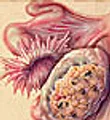ByCharlene Laino
WebMD Health News Reviewed byLaura J. Martin, MD

Dec. 7, 2012 (San Antonio) -- Current screening tests may miss as many as 1 in 50 women with breast cancer who would benefit from treatment with highly effective breast cancer drugs.
At issue is HER2-positive breast cancer, an aggressive form of the disease that was difficult to treat until the FDA approved the drug Herceptin in 1998. Herceptin revolutionized the treatment of HER2-positive breast cancer, reducing the risk of recurrence and prolonging lives.
Since then, two other drugs, Tykerb and Perjeta, have been approved for the treatment of HER2-positive breast cancer. Others are in the pipeline.
The new study involved 1,500 women found to be HER2-negative on routine HER2 testing. Genetic analysis showed 25 had HER2 mutations.
"These mutations would be missed by current HER2 testing," says researcher Ron Bose, MD, PhD, of the Washington University School of Medicine in St. Louis.
"As a result, the women would not receive potentially lifesaving treatment with HER2 targeted drugs," he says.
The findings were presented at the San Antonio Breast Cancer Symposium (SABCS) here and published online in the journal Cancer Discovery.
A Visual Guide to Breast Cancer
HER2 Mutations
A patient must have more than the normal two copies of the HER2 gene to be classified as HER2-positive. About 20% to 25% of women with breast cancer fall into this category. The excess HER2 drives tumor growth.
The HER2 mutations stimulate tumor growth in a different way. "Many turn on HER2 activity in an inappropriate manner, which probably results in abnormal, unregulated HER2 signaling. This is likely driving the cancer cell," Bose says.
The genetic analyses revealed that 1.5% to 2% of all breast cancer patients have these genetic mutations. With about 230,000 new cases of breast cancer in the United States each year, even this modest percentage translates into more than 4,000 patients per year.
Will HER2 Targeted Drugs Help?
In laboratory tests, Herceptin and Tykerb killed many of the mutant cells. Two mutations that were resistant to Tykerb responded well to neratinib, an experimental anti-HER2 drug.
Some mutations were found to be "silent," meaning they did not drive tumor growth and therefore would likely not respond to anti-HER2 drugs, Bose says.
Now the researchers have launched a study in which women will be screened for HER2 mutations. Those who have the mutations will be given neratinib. Doctors will follow the women to see if the drug is effective and safe.
Asked if the high cost of genetic analysis would prohibit its routine use, Bose says that it is increasingly being used in other forms of disease, such as lung cancer.
If trial results show that attacking the newfound mutations can prevent recurrences and save lives, then gene tests -- and their cost -- will quickly be accepted as part of the standard of care.
"In the future, we will probably be talking about panels of relevant genes that will need to be sequenced in breast cancer," he says.
SABCS co-director Kent Osborne, MD, a breast cancer specialist at Baylor College of Medicine in Houston, says he believes even more mutations that drive breast cancer growth will be discovered in coming years.
And it's likely the newly discovered mutations may promote growth of other types of tumors as well, he says.
Osborne says he would also like to see studies testing whether the anti-HER2 drugs already on the market benefit women with the mutations.
View Article Sources

SOURCES:
San Antonio Breast Cancer Symposium, San Antonio, Texas, Dec. 4-8, 2012.
Bose, R. Cancer Discovery, published online Dec. 7, 2012.
Ron Bose, MD, PhD, Washington University School of Medicine, St. Louis.
Kent Osborne, MD, Baylor College of Medicine, Houston.
© 2012 WebMD, LLC. All rights reserved. #url_reference {display: none};#url_reference { display: block; line-height: 150%; margin-bottom: 10px; }#logo_rdr img { visibility: visible; }.titleBar_rdr .titleBarMiddle_fmt { padding-top: 1.5em !important;} Top Picks When to Get a Screening Mammogram Slideshow: Stress-Reducing Foods Health Check: Breast Cancer Treatment Options Breast Cancer's Link to Bone Metastasis Suspicious Mammogram Result: Now What? 7 Tips to Quit Smoking for Good Breast Cancer Home News Reference Videos Community Questions and Answers Glossary Medications

Breast Cancer Guide 1 Overview & Facts 2 Symptoms & Types 3 Diagnosis & Tests 4 Treatment & Care 5 Living & Managing 6 Support & Resources See what others are asking about
Visit WebMD Answers
Related to Breast Cancer Breast Cancer Screening Breast Problems Breast Reconstruction Surgery Cervical Cancer Clinical Trials Hair Loss Living Healthy Ovarian Cancer Women’s Health More Related Topics Today in Breast Cancer

HEALTH CHECK Dealing With Breast Cancer?

SLIDESHOW Breast Cancer: Symptoms and Treatments

SLIDESHOW Top Cancer-Fighting Foods

Article Can Estrogen Lower Breast Cancer Risk? .answers_promo_slide {background:#fff;position:fixed;bottom: 0px;display:none;right:-510px;width:510px;z-index:9999;}* html div.answers_promo_slide { position: absolute; }.answers_promo_slide .top {background:url('http://img.webmd.com/dtmcms/live/webmd/consumer_assets/site_images/modules/answers_slide_top_bot.png') top left repeat-x;font-size:1%;height:33px;}.answers_promo_slide .top .left {float:left;height:33px;width:33px;}.answers_promo_slide .bot {background:url('http://img.webmd.com/dtmcms/live/webmd/consumer_assets/site_images/modules/answers_slide_top_bot.png') bottom left repeat-x;font-size:1%;height:20;}.answers_promo_slide .bot .left {background:url('http://img.webmd.com/dtmcms/live/webmd/consumer_assets/site_images/modules/answers_slide_corner.png') bottom left no-repeat;height:20px;width:20px;}.answers_promo_slide .top a {background:url('http://img.webmd.com/dtmcms/live/webmd/consumer_assets/site_images/modules/answers_slide_corner.png') top right no-repeat;display:block;height:33px;text-indent:-5000px;width:33px;}.answers_promo_slide .top a span {text-indent:-5000px;}.answers_promo_slide .content {background:url('http://img.webmd.com/dtmcms/live/webmd/consumer_assets/site_images/modules/answers_slide_bg.png') top left repeat-y;clear:both;padding-bottom:15px;}.answers_promo_slide h3 {display:inline;float:left;margin:0 0 0 20px;width:208px;height:50px;}.answers_promo_slide h3 a {background:url('http://img.webmd.com/dtmcms/live/webmd/consumer_assets/site_images/modules/answers_mod_logo.png') no-repeat;display:block;width:208px;height:50px;text-indent:-5000px;}.answers_promo_slide h3 span {text-indent:-5000px;}.answers_promo_slide ul {clear:both;margin:10px 0 0 20px;padding:0;list-style:none;}.answers_promo_slide li {line-height:18px;}.answers_promo_slide form.qasearch {float:left;position: relative;margin:-10px 0 0 10px;padding:0;width:270px;}.answers_promo_slide form.qasearch label {color: #5E9EBE;display: none;font-size: 110%;height: 20px;left: 5px;position: absolute;top: 32px;width: 190px;}.answers_promo_slide form.qasearch fieldset {border: none;margin: 0;padding: 0;}.answers_promo_slide form.qasearch fieldset legend {color:#333;display:block;font-size:125%;font-weight:normal;margin:0;padding:2px 0 0 0;}* html .answers_promo_slide form.qasearch fieldset legend {margin-left:-6px;}*+html .answers_promo_slide form.qasearch fieldset legend {margin-left:-6px;}.answers_promo_slide form.qasearch input.question {height: 20px;width: 190px;font-size: 110%;color: #5e9ebe;float: left;margin: 5px 10px 0 0;position: relative;}.answers_promo_slide form.qasearch input.asknow {background: url('http://img.webmd.com/dtmcms/live/webmd/consumer_assets/site_images/modules/btn_ask.png') 0 0px no-repeat;border:0 none;cursor:pointer;display:block;float:left;font-size:0;height:25px;line-height:0;margin:5px 0 0;text-indent:-5000px;width:42px;} Close WebMD AnswersMore breast cancer questions?Ask Your QuestionWhat is breast cancer?Who is at risk for breast cancer?What should I know about breast reconstruction after breast cancer?

VIDEO Breast Cancer Treatments Improving

SLIDESHOW Quit-Smoking Tips for the First Hard Days

Article Mammogram Screening Guidelines

SLIDESHOW Essential Screenings for Every Woman

SLIDESHOW Ovarian Cancer: a Visual Guide

Article Breast Cancer: Steps to Reduce Your Risk

HEALTH CHECK What Is Your Cancer Risk?

SLIDESHOW Reduce Stress and Revitalize Your Life Subscribe to WebMD Newsletters WebMD Daily Women's Health Men's Health Weight Loss Wisdom I have read and agree to WebMD's Privacy Policy. Submit Sign up for more topics! WebMD Special Sections How to Perform a Breast Self-Exam Health Solutions From Our Sponsors Vaccine Questions? Low Testosterone? Bipolar Disorder Facts Birth Control for Moms Blood Sugar Control Bent Fingers? Diagnosed With Low T? Fibromyalgia & Exercise Depression & Adults Child with Diabetes? Vaccines for All Ages Knee Pain Relief Itchy, Scaly Skin? Hearing Aid Alternative Relapsing MS Help In-depth coverage: Psoriasis Treatment on Target?|Healthy Mouth Help|RA Assessment|Living Healthy Guide|Family & Pregnancy Toolbox|Check Your Heartburn Symptoms Find us on:URAC: Accredited Health Web Site

HonCode: Health on the Net FoundationAdChoicesAbout WebMD Advertise With Us Terms of Use Privacy Policy Sponsor Policy Site Map Careers Contact UsMedscape Reference eMedicineHealth RxList Medscape MedicineNet BootsWebMD WebMD CorporateMedical Dictionary-->First Aid WebMD Magazine WebMD Health Record WebMD Mobile Newsletters Dictionary Physician Directory
©2005-2012 WebMD, LLC. All rights reserved.
WebMD does not provide medical advice, diagnosis or treatment. See additional information.
View the
Original article


















 HEALTH CHECK Dealing With Breast Cancer?
HEALTH CHECK Dealing With Breast Cancer?  SLIDESHOW Breast Cancer: Symptoms and Treatments
SLIDESHOW Breast Cancer: Symptoms and Treatments  SLIDESHOW Top Cancer-Fighting Foods
SLIDESHOW Top Cancer-Fighting Foods  Article Can Estrogen Lower Breast Cancer Risk? .answers_promo_slide {background:#fff;position:fixed;bottom: 0px;display:none;right:-510px;width:510px;z-index:9999;}* html div.answers_promo_slide { position: absolute; }.answers_promo_slide .top {background:url('http://img.webmd.com/dtmcms/live/webmd/consumer_assets/site_images/modules/answers_slide_top_bot.png') top left repeat-x;font-size:1%;height:33px;}.answers_promo_slide .top .left {float:left;height:33px;width:33px;}.answers_promo_slide .bot {background:url('http://img.webmd.com/dtmcms/live/webmd/consumer_assets/site_images/modules/answers_slide_top_bot.png') bottom left repeat-x;font-size:1%;height:20;}.answers_promo_slide .bot .left {background:url('http://img.webmd.com/dtmcms/live/webmd/consumer_assets/site_images/modules/answers_slide_corner.png') bottom left no-repeat;height:20px;width:20px;}.answers_promo_slide .top a {background:url('http://img.webmd.com/dtmcms/live/webmd/consumer_assets/site_images/modules/answers_slide_corner.png') top right no-repeat;display:block;height:33px;text-indent:-5000px;width:33px;}.answers_promo_slide .top a span {text-indent:-5000px;}.answers_promo_slide .content {background:url('http://img.webmd.com/dtmcms/live/webmd/consumer_assets/site_images/modules/answers_slide_bg.png') top left repeat-y;clear:both;padding-bottom:15px;}.answers_promo_slide h3 {display:inline;float:left;margin:0 0 0 20px;width:208px;height:50px;}.answers_promo_slide h3 a {background:url('http://img.webmd.com/dtmcms/live/webmd/consumer_assets/site_images/modules/answers_mod_logo.png') no-repeat;display:block;width:208px;height:50px;text-indent:-5000px;}.answers_promo_slide h3 span {text-indent:-5000px;}.answers_promo_slide ul {clear:both;margin:10px 0 0 20px;padding:0;list-style:none;}.answers_promo_slide li {line-height:18px;}.answers_promo_slide form.qasearch {float:left;position: relative;margin:-10px 0 0 10px;padding:0;width:270px;}.answers_promo_slide form.qasearch label {color: #5E9EBE;display: none;font-size: 110%;height: 20px;left: 5px;position: absolute;top: 32px;width: 190px;}.answers_promo_slide form.qasearch fieldset {border: none;margin: 0;padding: 0;}.answers_promo_slide form.qasearch fieldset legend {color:#333;display:block;font-size:125%;font-weight:normal;margin:0;padding:2px 0 0 0;}* html .answers_promo_slide form.qasearch fieldset legend {margin-left:-6px;}*+html .answers_promo_slide form.qasearch fieldset legend {margin-left:-6px;}.answers_promo_slide form.qasearch input.question {height: 20px;width: 190px;font-size: 110%;color: #5e9ebe;float: left;margin: 5px 10px 0 0;position: relative;}.answers_promo_slide form.qasearch input.asknow {background: url('http://img.webmd.com/dtmcms/live/webmd/consumer_assets/site_images/modules/btn_ask.png') 0 0px no-repeat;border:0 none;cursor:pointer;display:block;float:left;font-size:0;height:25px;line-height:0;margin:5px 0 0;text-indent:-5000px;width:42px;} Close WebMD AnswersMore breast cancer questions?Ask Your QuestionWhat is breast cancer?Who is at risk for breast cancer?What should I know about breast reconstruction after breast cancer?
Article Can Estrogen Lower Breast Cancer Risk? .answers_promo_slide {background:#fff;position:fixed;bottom: 0px;display:none;right:-510px;width:510px;z-index:9999;}* html div.answers_promo_slide { position: absolute; }.answers_promo_slide .top {background:url('http://img.webmd.com/dtmcms/live/webmd/consumer_assets/site_images/modules/answers_slide_top_bot.png') top left repeat-x;font-size:1%;height:33px;}.answers_promo_slide .top .left {float:left;height:33px;width:33px;}.answers_promo_slide .bot {background:url('http://img.webmd.com/dtmcms/live/webmd/consumer_assets/site_images/modules/answers_slide_top_bot.png') bottom left repeat-x;font-size:1%;height:20;}.answers_promo_slide .bot .left {background:url('http://img.webmd.com/dtmcms/live/webmd/consumer_assets/site_images/modules/answers_slide_corner.png') bottom left no-repeat;height:20px;width:20px;}.answers_promo_slide .top a {background:url('http://img.webmd.com/dtmcms/live/webmd/consumer_assets/site_images/modules/answers_slide_corner.png') top right no-repeat;display:block;height:33px;text-indent:-5000px;width:33px;}.answers_promo_slide .top a span {text-indent:-5000px;}.answers_promo_slide .content {background:url('http://img.webmd.com/dtmcms/live/webmd/consumer_assets/site_images/modules/answers_slide_bg.png') top left repeat-y;clear:both;padding-bottom:15px;}.answers_promo_slide h3 {display:inline;float:left;margin:0 0 0 20px;width:208px;height:50px;}.answers_promo_slide h3 a {background:url('http://img.webmd.com/dtmcms/live/webmd/consumer_assets/site_images/modules/answers_mod_logo.png') no-repeat;display:block;width:208px;height:50px;text-indent:-5000px;}.answers_promo_slide h3 span {text-indent:-5000px;}.answers_promo_slide ul {clear:both;margin:10px 0 0 20px;padding:0;list-style:none;}.answers_promo_slide li {line-height:18px;}.answers_promo_slide form.qasearch {float:left;position: relative;margin:-10px 0 0 10px;padding:0;width:270px;}.answers_promo_slide form.qasearch label {color: #5E9EBE;display: none;font-size: 110%;height: 20px;left: 5px;position: absolute;top: 32px;width: 190px;}.answers_promo_slide form.qasearch fieldset {border: none;margin: 0;padding: 0;}.answers_promo_slide form.qasearch fieldset legend {color:#333;display:block;font-size:125%;font-weight:normal;margin:0;padding:2px 0 0 0;}* html .answers_promo_slide form.qasearch fieldset legend {margin-left:-6px;}*+html .answers_promo_slide form.qasearch fieldset legend {margin-left:-6px;}.answers_promo_slide form.qasearch input.question {height: 20px;width: 190px;font-size: 110%;color: #5e9ebe;float: left;margin: 5px 10px 0 0;position: relative;}.answers_promo_slide form.qasearch input.asknow {background: url('http://img.webmd.com/dtmcms/live/webmd/consumer_assets/site_images/modules/btn_ask.png') 0 0px no-repeat;border:0 none;cursor:pointer;display:block;float:left;font-size:0;height:25px;line-height:0;margin:5px 0 0;text-indent:-5000px;width:42px;} Close WebMD AnswersMore breast cancer questions?Ask Your QuestionWhat is breast cancer?Who is at risk for breast cancer?What should I know about breast reconstruction after breast cancer?  VIDEO Breast Cancer Treatments Improving
VIDEO Breast Cancer Treatments Improving  SLIDESHOW Quit-Smoking Tips for the First Hard Days
SLIDESHOW Quit-Smoking Tips for the First Hard Days  Article Mammogram Screening Guidelines
Article Mammogram Screening Guidelines  SLIDESHOW Essential Screenings for Every Woman
SLIDESHOW Essential Screenings for Every Woman  SLIDESHOW Ovarian Cancer: a Visual Guide
SLIDESHOW Ovarian Cancer: a Visual Guide  Article Breast Cancer: Steps to Reduce Your Risk
Article Breast Cancer: Steps to Reduce Your Risk  HEALTH CHECK What Is Your Cancer Risk?
HEALTH CHECK What Is Your Cancer Risk?  SLIDESHOW Reduce Stress and Revitalize Your Life Subscribe to WebMD Newsletters WebMD Daily Women's Health Men's Health Weight Loss Wisdom I have read and agree to WebMD's Privacy Policy. Submit Sign up for more topics! WebMD Special Sections How to Perform a Breast Self-Exam Health Solutions From Our Sponsors Vaccine Questions? Low Testosterone? Bipolar Disorder Facts Birth Control for Moms Blood Sugar Control Bent Fingers? Diagnosed With Low T? Fibromyalgia & Exercise Depression & Adults Child with Diabetes? Vaccines for All Ages Knee Pain Relief Itchy, Scaly Skin? Hearing Aid Alternative Relapsing MS Help In-depth coverage: Psoriasis Treatment on Target?|Healthy Mouth Help|RA Assessment|Living Healthy Guide|Family & Pregnancy Toolbox|Check Your Heartburn Symptoms Find us on:URAC: Accredited Health Web Site
SLIDESHOW Reduce Stress and Revitalize Your Life Subscribe to WebMD Newsletters WebMD Daily Women's Health Men's Health Weight Loss Wisdom I have read and agree to WebMD's Privacy Policy. Submit Sign up for more topics! WebMD Special Sections How to Perform a Breast Self-Exam Health Solutions From Our Sponsors Vaccine Questions? Low Testosterone? Bipolar Disorder Facts Birth Control for Moms Blood Sugar Control Bent Fingers? Diagnosed With Low T? Fibromyalgia & Exercise Depression & Adults Child with Diabetes? Vaccines for All Ages Knee Pain Relief Itchy, Scaly Skin? Hearing Aid Alternative Relapsing MS Help In-depth coverage: Psoriasis Treatment on Target?|Healthy Mouth Help|RA Assessment|Living Healthy Guide|Family & Pregnancy Toolbox|Check Your Heartburn Symptoms Find us on:URAC: Accredited Health Web Site